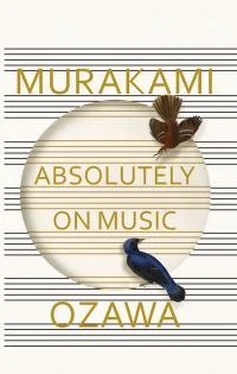OZAWA: There have been suggestions that I take this orchestra on tour. My manager and others think I ought to have them perform more widely, since we’ve gone to all the trouble of whipping them into such superb shape. Currently we just have the two recitals in Geneva and Paris, and I agree it is a kind of a waste. It would make sense to put a tour together and perform in Vienna or Berlin or Tokyo or New York. But so far I’ve turned down all such suggestions. I just don’t see the need for it. Of course it’s not entirely out of the realm of possibility. It might be conceivable sometime in the future.
MURAKAMI: That’s a hard thing to decide. If the orchestra were to become firmly established, your educational objectives might suffer. I suppose the ways in which you guide and conduct this kind of student orchestra are very different from the way you “train” a first-class orchestra such as the Boston Symphony or the Vienna Philharmonic.
OZAWA: Yes, very different, both in attitude and in techniques. In the case of a professional orchestra, you’ve got three days to whip a whole concert’s worth of material into shape. You’ve got a fixed schedule with absolutely no wiggle room. In the case of this orchestra, though, the number of pieces is far more limited, so you can pour a lot of time into rehearsing each one. Take the rehearsals we’re doing now: we probe very deeply into each piece. And the more you rehearse, the more difficulties come to the surface.
MURAKAMI: You mean, the more time you spend rehearsing, the more difficult become the various hurdles that need to be cleared?
OZAWA: That’s right. You may get them to where they’re all breathing together, but still the parts are not perfectly synced. The nuances of sound are a little off, say, or the rhythms are not quite together. So you put lots of time into refining each of these tiny details. That way, tomorrow’s performance should be at an even higher level. So then you demand even more from them. This process teaches me an awful lot.
MURAKAMI: What is it that you learn?
OZAWA: Well, it brings out my own greatest weaknesses.
MURAKAMI: Your greatest weaknesses?
OZAWA: Yes, they come out right away when we’re concentrating on such tiny details.
Murakami note: He spends some time thinking more about this, but finally does not provide concrete examples.
MURAKAMI: Of course, I have no idea what your weaknesses might be, but one thing I can say for sure is that each day you work with the orchestra, the more its sound becomes your sound. I think it’s amazing that you can actually make such a thing happen.
OZAWA: It just goes to show the high caliber of these musicians.
MURAKAMI: In observing the academy, I realized for the first time how much hard work it takes to create an orchestral sound that has individuality and direction and presence. But you said earlier that your ability to play music becomes even better when you’ve played in a string quartet. Can you give me some concrete examples of exactly how this works?
OZAWA: Well, look, let me put this as simply as possible. When you’re playing with an ensemble—as opposed to when you’re performing by yourself—your ears are open in all directions. This is very important for a musician. It’s the same when you’re playing in an orchestra, of course, in the sense that you have to keep listening to what the others are doing. But in a string quartet, you can have more intimate communication among the instruments. While you play, you listen to the others. You think, “Hey, that’s very nice, what the cello is doing now,” or “My sound doesn’t quite match the viola’s.” Also, the musicians are able to speak to each other and exchange their personal opinions. You can’t have that in an orchestra; there are just too many people. But when there are just four of you, you can voice your opinions to each other directly. You have that kind of easy interaction. And so the musicians are able to listen to each other’s playing very closely, as a result of which you can clearly hear their music getting better and deeper. It really works.
MURAKAMI: I see what you mean. But still, as an outside observer, I couldn’t help noticing that everybody’s playing with this confident look on their faces, like “Hey, I’m the best one here!”
OZAWA [ laughing ]: It’s true, we do get some of that. Especially among the Europeans. It’s a little different in Japan.
MURAKAMI: You mean, Japanese musicians don’t show their confidence so openly? You’ve been running this same kind of program in Okushiga and Switzerland, but I would guess you find yourself teaching in subtly different ways in the two places.
OZAWA: Hmm, maybe so. Japanese musicians have their own strengths—they work well together, and they study very hard. In Okushiga, this can assert itself in both positive and negative ways. When people are openly self-assertive in Japan, we say … uh, what’s that expression?
MURAKAMI: You mean “Deru kugi wa utareru” [The nail that sticks out gets hammered down]?
OZAWA: Yes, maybe that, or something like it. You’re not supposed to say or do anything that makes you stand out, or sounds as if you’re nosing into someone else’s business. Respect the consensus. Practice restraint. If you’re squeezed into a commuter train in the morning, don’t say a thing. Just shut up and bear it. Behavior like that can be good in a program like ours, but also not so good. If I took these European students to Tokyo and put them on an eight o’clock commuter train, they’d explode! [ Laughter. ] They wouldn’t be able to stand being pushed around that way.
MURAKAMI: I can imagine it! [ Laughter. ]
OZAWA: In any case, self-assertion is perfectly normal here in Europe. It’s the only way to survive. In Japan, though, people think and think and think about things until they finally take action—or take no action at all. So we’ve got that major difference to deal with, and I’m not sure which mentality is better. In the case of a string quartet, though, the European way is definitely superior. You get the best results when each member asserts his opinion. That’s why in Japan I find myself yelling “Don’t hold back!” until I’m blue in the face.
MURAKAMI: Because they do hold back.
OZAWA: You’ve watched our practice sessions in Switzerland. Next you should come to Okushiga. You’ll see the difference immediately. It’s like night and day. Unfortunately we couldn’t hold the Okushiga academy this year because of the earthquake. I was hoping to have you come.
MURAKAMI: I’m very much looking forward to the next one. But about these European students: they talk back when they’re not convinced by the teacher’s instructions. “Here’s what I think we ought to do,” they’ll say. Even with a superstar like Robert Mann, if they don’t understand what he’s telling them, they’ll just say they don’t get it. A Japanese student couldn’t do such a thing. If a young Japanese student talked back to a distinguished teacher, he’d get cold stares from the other students: “What a disrespectful jerk! Who do you think you are?”
OZAWA: I think you’re right.
MURAKAMI: It’s true in just about any field in Japan. Maybe even in writers’ circles. People can’t do anything until they’ve gauged the opinions of the other people present. They look around, they absorb the atmosphere, and only then do they raise their hands and say something unobjectionable. That way, there’s no progress where it matters, and the status quo becomes set in stone.
OZAWA: You know, recently, among young musicians in Japan, there’s a growing chasm between those who get out of the country as soon as possible and those who stay in Japan even when they have an opportunity to go abroad. In the old days, a lot of people wanted to go abroad but couldn’t, because they didn’t have the money. These days, it’s fairly easy to go if you want to, but the number of people who choose not to go seems to be increasing.
Читать дальше











